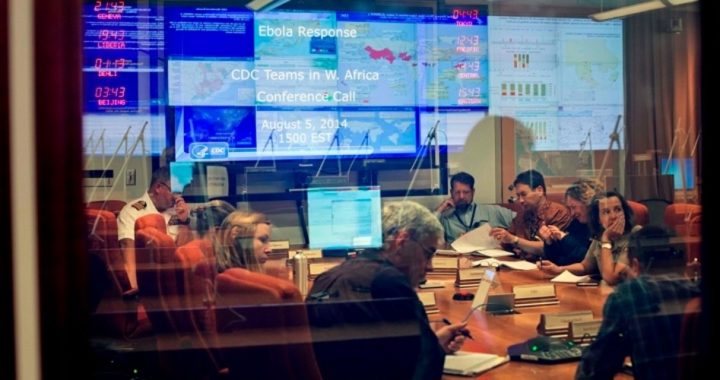
As another U.S. missionary doctor serving in Liberia has come down with the Ebola virus, the head of the federal Centers for Disease Control declared that while the disease is “out of control” in West Africa, it poses no threat to the United States.
Recently returned from a trip to West Africa’s Ebola crisis points in Liberia, Sierra Leone, and Guinea, CDC director Dr. Tom Frieden appeared on CBS This Morning September 2 to say that the world is in the midst of its first Ebola epidemic, “and it’s spiraling out of control. It’s bad now, and it’s going to get worse in the very near future. There is still a window of opportunity to tamp it down, but that window is closing. We really have to act now.”
Meanwhile, the third U.S. medical missionary serving in Liberia has been diagnosed with the potentially deadly virus. SIM, the same missionary organization with which another U.S. Ebola victim, nurse Nancy Writebol, was working in Liberia, identified the latest medical missionary to come down with the disease as Dr. Rick Sacra, a 51-year-old family physician from Massachusetts.
Writebol and U.S. physician Kent Brantly, who were described as gravely ill with Ebola before being shipped back to the U.S. under extreme isolation in early August, have both reportedly recovered from the disease.
SIM president Bruce Johnson said that Sacra, who has served in Liberia for several years, had returned to the country only last month after his two fellow American missionaries were diagnosed with Ebola.
Johnson said in a statement that “my heart was deeply saddened, but my faith was not shaken, when I learned another of our missionary doctors contracted Ebola. As a global mission, we are surrounding our missionary with prayer, as well as our LiberianSIM/ELWA colleagues, who continue fighting the Ebola epidemic in Liberia. We have gifted Liberian doctors, medical staff, and support staff who are carrying on the fight.”
Johnson said that Sacra is presently being treated by doctors and staff at the same hospital where, until just days ago, he was delivering babies. The SIM director said medical officials were not certain how Sacra had contracted the disease since he had not been working in the hospital’s Ebola isolation unit. According to Johnson, Sacra quarantined himself in the hospital’s Ebola ward after showing symptoms of the disease.
Asked if Sacra would be returned to the United States for treatment, as Writebol and Brantly were, Johnson said medical officials were considering all options but would for the time being continue to treat Sacra in Liberia, where he was described as being in good spirits.
In mid-August CBS News reported that at least two doctors working with Ebola patients in Sierra Leone had already died of the disease. Dr. Modupeh Cole reportedly died August 13 at a treatment center managed by Doctors Without Borders. “Health officials said the doctor became ill after treating a patient at Connaught Hospital, the leading facility in the capital of Freetown, where he worked,” reported CBS News. Cole’s death came just two weeks after Dr. Sheik Umar Khan, a virologist in Sierra Leone, died from the disease.
And on August 25 AllAfrica.com reported that a doctor serving at Liberia’s John F. Kennedy Medical Center in Monrovia had died of Ebola after receiving an injection of the experimental drug ZMapp, the same drug administered to Writebol and Brantly.
The CDC’s Frieden said on CBS This Morning that the United States must work harder to perfect such medicines as Zmapp in order to fight Ebola. “The epidemic is going faster than we are, so we need to scale up our response,” he said. “We can hope for new tools, and maybe they’ll come, but we can’t count on them.”
The World Health Organization (WHO) recently warned that the “magnitude of the Ebola outbreak has been vastly underestimated,”saying that at least 3,069 people have come down with the disease, and 1,552 have died — a fatality rate of more than 50 percent. WHO has predicted that at least 20,000 people will perish from Ebola before it is gotten under control.
Meanwhile, Frieden and the CDC are sending mixed signals about the possibility of Ebola entering the United States. While calling the latest spread of Ebola “the largest, most complex outbreak that we know of in history,” Frieden insisted that the disease “poses little risk to the U.S. general population,” emphasizing that its spread across the United States “is not in the cards.”
But in an August 29 memo to universities with students and staff who travel overseas to areas impacted by Ebola, the CDC went to great lengths to emphasize the risks to Americans and of the necessary precautions to prevent them from being exposed to the disease.
As for the potential of Ebola entering the United States, The New American’s Alex Newman noted that with “illegal immigrants flooding across the U.S. border, it is hardly far-fetched to suppose that the disease will eventually reach American shores, too. Already, dozens of illegal immigrants from the three African countries suffering the most severe Ebola outbreaks have been apprehended crossing the U.S. border with Mexico.”
In the event of an outbreak of the disease the CDC assures us will not happen in the United States, how might a government plan to “fight” the virus shape up? Newman wrote that “draconian-sounding preparations” are even now being set in place, while “many have been in place for years.” Newman noted that recently President Obama signed an amendment to George W. Bush “Executive Order” 13295, that will purportedly “grant his administration vast powers to detain Americans suspected of harboring a ‘respiratory illness.’”
At the state level, continued Newman, a “model” law “created by the feds and the WHO on ‘Emergency Health Powers,’ which provides officials with purported powers blasted as “draconian” by critics, has been adopted in whole or in part by some four in five state governments.”
At least one prominent and respected physician, Dr. Ben Carson, was critical of the decision to bring Writebol and Brantly back to the U.S. to be treated for Ebola, and said the risk to the U.S. was being understated.
As reported by Breitbart.com, the former director of Pediatric Neurosurgery at Johns Hopkins University and Hospital, “explained that a simple medical mistake could cause the disease to spread within the borders of the United States because the bodily fluids of an infected patients remain infected for many days.”
Asked if there was a valid concern about Ebola spreading throughout the United States, Carson said that the risk “is very real. It is a highly contagious disease and all it requires is some infractions in procedures and all of a sudden you have got more spread, and that’s what I’m afraid of.”
Photo shows CDC officials in Atlanta in a conference call with CDC team members in West Africa, Aug. 5, 2014: AP Images



